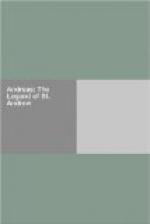1338. The Greek explains that God had put the sign of the cross on Andrew’s face.
1376. I have here ventured an emendation of my own. The sentence as it stands is without a main verb, and 1377^a is metrically deficient. I would read:—
Hwaet m[=e] [=e]aethe [maeg] aelmihtig
God
n[=i]etha [generian], se ethe in n[=i]edum
[=i]u.
See under generian in Grein’s Sprachschalz.
1478 ff. This passage is certainly ambiguous. That h[=a]liges refers to Andrew, and not to God, is shown by the use of h[=e] in 1. 1482.
1493. I follow Grein’s emendation, and read saelwaege = “castle wall,” although the word is not found elsewhere. If we read saelwange with Wuelker, the meaning of under must be greatly stretched. Moreover, the Greek says: “He saw a pillar standing in the midst of the prison.”
1508. Reading geofon with Grimm, Kemble, etc., as also in 393 and 1585.
1545. Reading wadu with Kemble and Grein.
1663. Apparently a line or two is missing here, though there is no break in the manuscript. I have translated in brackets Grein’s conjectural emendation, as supplying the probable meaning.
1667. I have again translated Grein’s emendation.
1681. Reading t[=i]r[=e]adigra with Kemble.
PROOFREADER’S COMMENTS
Text between slashes — e.g. xxxxx — was originally BOLD. Non-Ascii characters are marked e.g. [=o] for o with a Macron. The line numbers are inconsistent, as in the original text.



